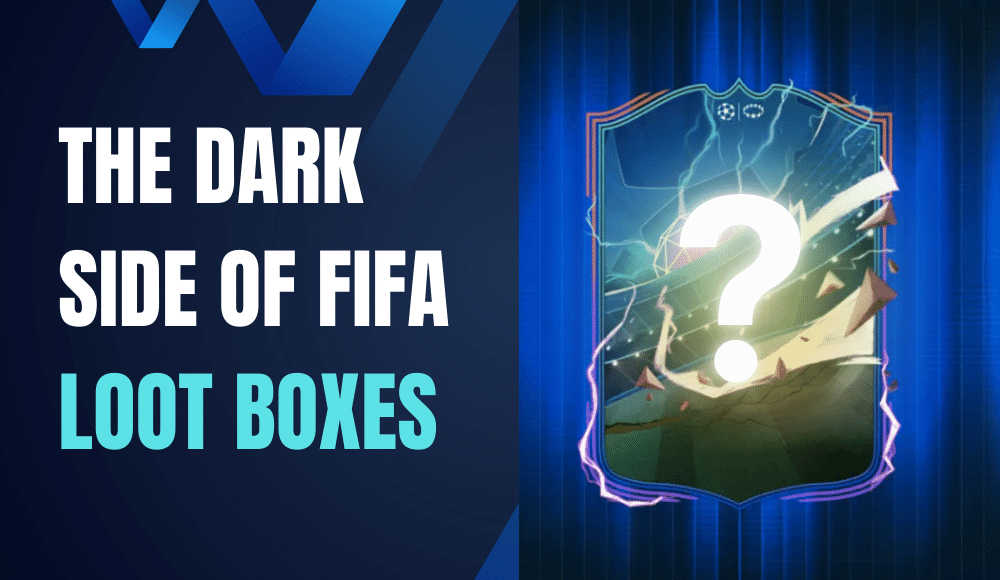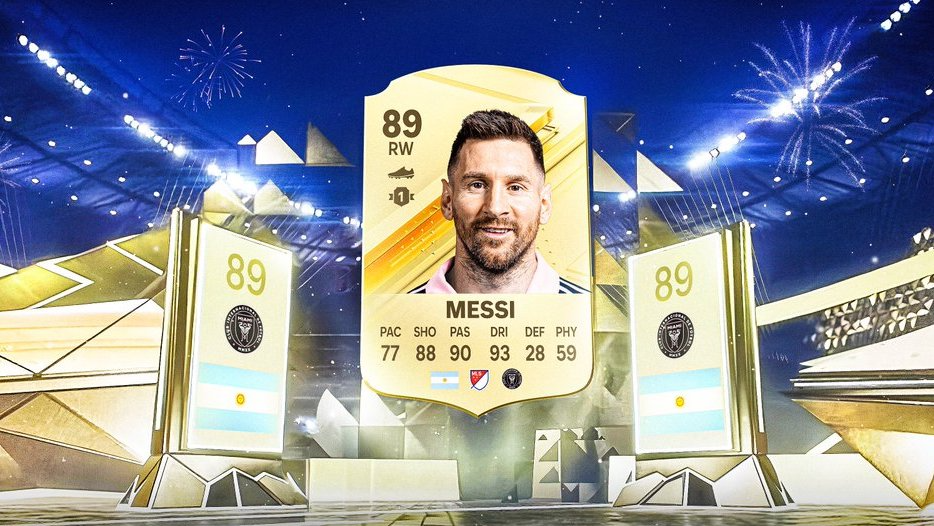The Dark Side of FIFA: An In-Depth Look at Loot Boxes
There is a sinister reality of Loot Boxes in FIFA and EA Sports FC

For the uninitiated, loot boxes are virtual grab bags that gamers can purchase, often with real money, to receive a random assortment of in-game items. Sounds harmless, right? Think again. The ethics of such a system have been under intense scrutiny, and, trust us, FIFA's been at the heart of the storm.
"Loot boxes are like the wild west of micro-transactions in video games; unregulated, unpredictable, and for some, an irresistible gamble."
And here's the kicker: in FIFA, these loot boxes, or as they like to call them, 'FIFA Ultimate Team packs', play a significant role in the overall gameplay. They contain everything from new players to team enhancements, and getting a good pull can dramatically alter your gameplay experience. So, is it all a game of chance or a carefully orchestrated moneymaking machine? Let's dive in.
Understanding Loot Boxes: The Mechanics, Allure, and Controversy
Before we delve into the specifics of EA Sports' FIFA and its use of loot boxes, let's first demystify what these digital treasure chests are all about. Loot boxes, my dear readers, are essentially virtual containers packed with randomized goodies. Here's a fun analogy: think of them as those exciting, heady packets of baseball cards from your childhood, except these are within the virtual realm of video games. You purchase them, you open them, and voila! You've got yourself a mix of player cards, team kits, stadiums, and whatnot. But here's the catch: you never know what's inside until you've already parted with your hard-earned (or not-so-hard-earned) cash. Intriguing, isn't it?
FIFA's Ultimate Team Packs: The Cash Cow of EA Sports
Now, let's talk about EA Sports' golden goose – FIFA's Ultimate Team Packs. These packs, a particular type of loot box, are an integral part of the FIFA video game series. Players can purchase these packs using real-world money or in-game currency, hoping to score rare and powerful players to boost their teams.
The revenue from these packs is nothing short of astonishing. In 2020, EA Sports raked in over $1 billion (yes, billion with a 'B') from these packs alone. That's the GDP of a small country, folks! However, while EA Sports is laughing all the way to the bank, ethical questions are brewing like a storm in the teacup.
The Ethical Debate: FIFA's Loot Boxes in the Crosshairs
The ethical debate surrounding FIFA's loot boxes is as fiery as a face-off between Messi and Ronaldo. Critics argue that the packs constitute a form of gambling, targeting vulnerable individuals and potentially leading to addictive behavior. On the other hand, EA Sports maintains that these packs are optional and simply provide an exciting element of chance.
Regardless of where you stand in this debate, one thing is clear: the conversation about the ethics of loot boxes in FIFA is far from over. As players, as consumers, as video game enthusiasts, we must keep asking these tough questions, keep demanding transparency and fairness. For now, the final score remains to be seen. But remember, in the world of video games, it’s always half-time somewhere!
The Legal Status of Loot Boxes and How It Affects FIFA

Now, let's take a moment to put our lawyer hats on, shall we? What's the legal status of these loot boxes, and how does it affect our beloved (or for some, not-so-beloved) FIFA? Well, it's a bit of a mixed bag, my friends.
In some countries, like Belgium and the Netherlands, loot boxes in video games like FIFA have been classified as gambling. Yep, you heard that right, gambling. They're about as welcomed there as a skunk at a garden party. The lawmakers in these countries argued that because you're spending real money for a chance at a random reward, it's a form of gambling. And in these countries, that's a big no-no unless you've got a gambling license. Regulators in several countries have investigated the use of loot boxes in video games and some have banned them or imposed restrictions on their use.
This has led to EA Sports, the makers of FIFA, being in a bit of a pickle. The company had to remove the ability to buy FIFA Points, the in-game currency used to buy loot boxes, in these countries. A bit like being told you can't sell beer at a football match. A real blow to the wallet, I'd say.
Now, on the flip side, in other parts of the world like the UK and the US, the powers-that-be have decided that loot boxes don't meet the legal definition of gambling. In their view, because you're guaranteed to get something from a loot box, even if it's as useful as a chocolate teapot, it's not gambling.
But, as you might imagine, this has led to a bit of a kerfuffle. There's a growing chorus of voices, including players, parents, and even some politicians, calling for stricter regulations on loot boxes in these regions. They argue that just because you're guaranteed a prize, it doesn't mean it's not a form of gambling. After all, a guaranteed prize of a plastic ring from a slot machine is still a gamble, isn't it?
So, in a nutshell, the legal status of loot boxes varies from country to country, and it's causing a real headache for game developers like EA Sports. It's a bit like trying to navigate a ship through a sea of shifting sands. And for games like FIFA, where loot boxes are a huge part of the experience, it's a challenge that's not going away anytime soon.
The bottom line? If your favourite part of FIFA is opening those Ultimate Team Packs hoping to score a Messi or a Ronaldo, you might want to keep an eye on the news. Because depending on where you live and how the wind blows, the days of loot boxes could be numbered.
The Psychology of Loot Boxes: Understanding Their Allure
So, why do we even fall for these shiny, little loot boxes in the first place, you ask? Well, it's a combination of psychology, clever design, and the classic human weakness for instant gratification. The allure of these loot boxes, especially in FIFA, is no accident. It's a careful, cunning orchestration of factors that tugs at our primitive, reward-seeking brain circuits.
The Dangle of Potential Rewards
Ever heard of Pavlov's dogs? Well, loot boxes use the same principle. The anticipation of a reward, such as getting that ultra-rare player in FIFA, sets off our dopamine pathways. Dopamine, folks, is our brain's "feel-good" chemical. We get a rush of it when we're about to open a loot box. It's a tantalizing dance of chance and hope that keeps us coming back for more.
The Lottery Effect
Another psychological aspect to consider is the lottery effect. The chance that, just maybe, this time, you'll hit the jackpot and snag that prized player. It's the same urge that has people buying lottery tickets or pulling the lever on a slot machine. The odds might be grim, but the thrill of potentially winning big is too enticing to resist. And FIFA, oh sweet, sweet FIFA, has perfected the art of harnessing this effect.
The Fear of Missing Out
And let's not forget the infamous FOMO - the Fear of Missing Out. EA Sports often releases limited-time packs that create a sense of scarcity. You know you might not need it, but that nagging thought that you might miss out on something special can drive you to make that purchase.
"The only thing we have to fear is fear itself...and missing out on that limited-time Ultimate Team Pack."
So, as you can see, there's a great deal of psychology behind the allure of loot boxes. It's a well-oiled machine designed to tap into our reward-seeking behaviors, gambling tendencies, and FOMO. It's not solely FIFA's doing, but they sure have mastered the craft. The next time you feel the itch to buy a loot box, remember this: you're not weak, you're just being played by a finely tuned psychological orchestra.
The Role of Chance and Probability in Loot Boxes

Oh FIFA's loot boxes, or as they like to call them - 'Player Packs', operate on principles of chance and probability. When you purchase a pack, you don't know who's going to pop out. It could be Lionel Messi or it could be your cousin Larry who plays Sunday league. Okay, it's not quite that extreme, but you get the point. Your chances of packing a top-tier player are about as slim as the likelihood of me ever understanding the offside rule.
Cracking the Code: The Odds in Loot Boxes
So, how does EA Sports determine the odds? Good question. It's as clear as a London fog. EA has never fully explained how they calculate them, citing proprietary algorithms and such. Fancy words for "none of your business, pal". But here's the kicker: they do disclose the minimum probability of obtaining certain classes of players. I mean, that's like saying there's a chance you might find a pearl in an oyster, but it's equally likely you'll just get a mouthful of seaweed.
"The probability of success is difficult enough to comprehend for adults, let alone for a child." - Dr. David Zendle, Experimental Psychologist
And therein lies the rub. The odds are stacked against you, my friend. But like a moth to a flame, we just can't resist. After all, if there's a one in a million chance, there's still a chance, right?
The Dicey Details: The Role of Probability
Now, let's talk probability. It's like the uninvited guest at your party who eats all your snacks and drinks all your beer. In FIFA's loot boxes, probability plays a significant role. The potentially great rewards are offset by the high probability of receiving something, well, not so great. And it's this tantalizing prospect of rare content that keeps us coming back for more, like a dog to a bone or a Kardashian to a camera.
So, there we have it. The role of chance and probability in loot boxes. It's a game of risk, of highs and lows, of dreams and disappointments. But hey, who are we to resist the allure of the unknown?
The Connection Between Loot Boxes and Gambling Addiction
Now, let's dive into the murky waters of gambling addiction and see how loot boxes are doing the breaststroke right in the middle of it. You might be thinking, "How can buying these harmless boxes be compared to gambling?".
Both loot boxes and gambling operate on the same principle - the thrill of the unknown. You're essentially staking something of value, whether it's your hard-earned cash or in-game currency, hoping to walk away with something even more valuable. Sounds like a slot machine in Vegas, doesn't it?
Psychologists have been sounding the alarm bells for quite some time now. They argue that the unpredictable 'reward' mechanisms of loot boxes are eerily similar to the risky behavior in gambling. Whether it's pulling the lever on a slot machine or opening a loot box in FIFA, it's all about that Dopamine hit, my friends.
Alternatives to Loot Boxes: What Are They and Do They Work?
Alright my dear readers, you've hung in there, and you're almost to the end. We've talked about the controversial nature of loot boxes in FIFA and the ethical quandaries they present. But here's a thought: what if we just kicked them to the curb? What are the alternatives to these vexing virtual vessels, and do they have any chance of working? Let's dive in!
Direct Purchases
One possible alternative is the classic, no-nonsense method of direct purchases. You want that snazzy player, you buy that snazzy player. No fuss, no muss. This would remove the random element and provide a clear, definitive cost for in-game items. But here's the kicker, would this be as profitable or exciting for players? Arguably not. Part of the thrill of loot boxes is the uncertainty, right? The anticipation, the suspense, the heart palpitations!
Grinding for Rewards
Then there's the good old-fashioned 'grit and grind' – earning rewards through gameplay. Sounds fair and square, doesn't it? But let's face facts, not everyone has the time or patience to grind through hours of gameplay for rewards. And, of course, there's the added problem that game developers might make the grind so unbearable that players will be practically begging for the return of loot boxes.
Subscription Models
Subscription models are the new kids on the block in the world of gaming monetization. They provide regular content updates and perks for a monthly fee. You know, like those fancy-shmancy streaming services we all adore so much. The idea here is to eliminate the need for loot boxes by providing a steady stream of new, fresh, and-exciting content. But will gamers be ready to shell out monthly for this? It's a tough call.
So, what's the verdict, folks? Do these alternatives work?
Well, we can't quite call it yet. It seems the gaming community is divided. Some applaud these alternatives for their transparency and fairness, while others miss the thrill of the mystery that comes with loot boxes. What we can say is that it's clear the industry needs to strike a balance between profitability and ethical gaming practices. So, over to you, game developers. Your move.
The Future of Loot Boxes in Video Gaming
Alright, folks, let's get out our crystal balls and take a peek into the future of loot boxes in video gaming, shall we? Fasten your seatbelts, it's gonna be a wild ride!
Firstly, the elephant in the room - regulation. With all the controversies surrounding loot boxes, it's likely that we're going to see more and more government bodies stepping in to regulate these mechanics. Don't be surprised if in the near future, you see headline news like, "Congress Passes Bill to Regulate Video Game Loot Boxes". The risks and ethical quandaries surrounding loot boxes are simply too colossal to ignore.
You might be thinking, "But, can't game companies just switch to other monetization models?" Well, that's a great question! The answer is, they can, and they probably will. But don't expect them to give up on loot boxes entirely. More likely, we'll see a shift towards more transparent, less predatory methods of implementing loot boxes - like disclosing odds or setting spending limits. industry experts argue that loot boxes are a necessary part of the business model for video game companies and that they provide a way for players to acquire new content without paying for expensive DLC or expansions.
The Rise of 'Ethical' Loot Boxes?
Yes, you heard it right, 'ethical' loot boxes could be on the horizon. It's time for these game companies to clean up their act and stop acting like dodgy car salesmen. There's an increasing demand for more transparency and fairness in the way loot boxes operate. In response to this, we could see more games following the 'Overwatch' model, where loot boxes only contain cosmetic items that do not affect gameplay.
Another possibility is that we might see the development of hybrid models, combining elements from loot boxes and other monetization strategies. This could look something like a subscription model where subscribers get a certain number of loot boxes per month, or a system where players can earn loot boxes through gameplay but also have the option to buy more.
More regulation, a shift towards ethical loot box practices, and perhaps some interesting new hybrid models. One thing's for sure though, the days of unchecked, predatory loot box practices are numbered. And to that, we say good riddance!





